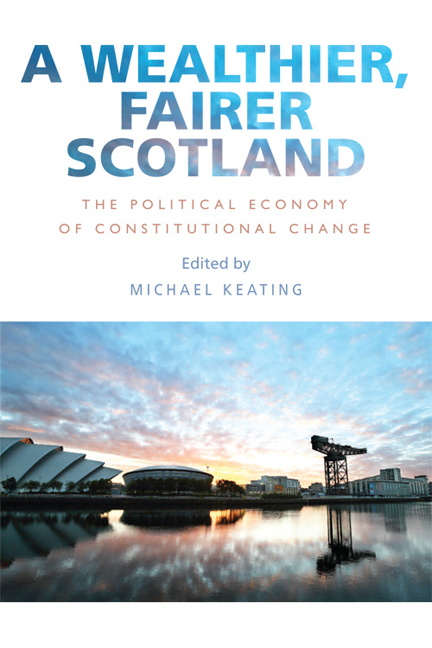Book contents
- Frontmatter
- Contents
- List of Figures
- List of Tables
- List of Contributors
- Preface
- 1 The Political Economy of Devolution
- 2 Taxes and Spending
- 3 Inequality in Scotland: Dimensions and Policy Responses
- 4 Towards a Fairer Scotland? Assessing the Prospects and Implications of Social Security Devolution
- 5 A More Gender-Equal Scotland? Childcare Policy in Scotland after the Independence Referendum
- 6 Constitutional Change, Social Investment and Prevention Policy in Scotland
- 7 Getting to a Wealthier and Fairer Scotland
- References
- Index
Preface
Published online by Cambridge University Press: 22 December 2017
- Frontmatter
- Contents
- List of Figures
- List of Tables
- List of Contributors
- Preface
- 1 The Political Economy of Devolution
- 2 Taxes and Spending
- 3 Inequality in Scotland: Dimensions and Policy Responses
- 4 Towards a Fairer Scotland? Assessing the Prospects and Implications of Social Security Devolution
- 5 A More Gender-Equal Scotland? Childcare Policy in Scotland after the Independence Referendum
- 6 Constitutional Change, Social Investment and Prevention Policy in Scotland
- 7 Getting to a Wealthier and Fairer Scotland
- References
- Index
Summary
In 2014, Scotland voted against independence but, following a pledge by the unionist parties, it then received additional powers over taxation and welfare. Added to existing powers devolved in 1999 and 2012, the Scotland Act (2016) endowed Scotland with the competences, potentially, to fulfil its ambition to create a wealthier and fairer nation. This book examines how this might be possible in practice. It will be of interest not only to students of Scotland but to all concerned with the potential of small nations and regions to master their own fates in a complex, multilevel world.
The book is the product of an interdisciplinary project in the Centre on Constitutional Change, funded by an Economic and Social Research Council grant, ES/L003325/1. The first book from this project (Keating 2017) examined the issues in the referendum debate, including institutions, economics, welfare and taxation and spending. This book looks to the future, returning to some of the same issues and asking how they might be resolved. Scotland's future constitutional status remains, at the time of writing, unresolved. The implications of UK withdrawal from the EU are unclear. As the chapters in this book show, the 2016 settlement, the result of a political compromise rather than a measured analysis of policy requirements, may not provide an optimal outcome. Whatever the political future, however, the question of how to reconcile economic growth with social justice and cohesion will remain.
- Type
- Chapter
- Information
- A Wealthier, Fairer ScotlandThe Political Economy of Constitutional Change, pp. viiiPublisher: Edinburgh University PressPrint publication year: 2017

